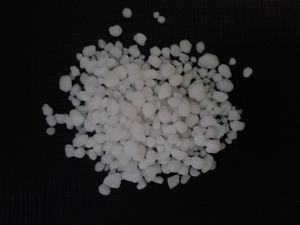Calcium nitrate
 Calcium nitrate in its hydrated form.
| |
| Names | |
|---|---|
| IUPAC name
Calcium nitrate
| |
| Other names
Calcium dinitrate
Kalksalpeter Lime nitrate Nitrocalcite Norwegian saltpeter | |
| Properties | |
| Ca(NO3)2 | |
| Molar mass | 164.088 g/mol (anhydrous) 236.15 g/mol (tetrahydrate) |
| Appearance | White hygroscopic solid |
| Odor | Odorless |
| Density | 2.504 g/cm3 (anhydrous) 1.896 g/cm3 (tetrahydrate) |
| Melting point | anhydrous 561 °C (1,042 °F; 834 K) tetrahydrate 42.7 °C (109 °F; 316 K) |
| Boiling point | anhydrous Decomposes tetrahydrate 132 °C (270 °F; 405 K) |
| anhydrous 121.2 g/100 ml (20 °C) 271 g/100 ml (40 °C) tetrahydrate 105 g/100 ml (0 °C) 129 g/100 ml (20 °C) 363 g/100 ml (100 °C) | |
| Solubility | Soluble in ammonia Almost insoluble in nitric acid Insoluble in esters, ethers, hydrocarbons, haloarbons |
| Solubility in acetone | 1.68 g/100 g (20 °C) |
| Solubility in ethanol | 51.4 g/100 g (20 °C) 62.9 g/100 g (40 °C)[1] |
| Solubility in methanol | 134 g/100 g (10 °C) 144 g/100 g (40 °C) 158 g/100 g (60 °C) |
| Vapor pressure | ~0 mmHg |
| Acidity (pKa) | 6.0 |
| Hazards | |
| Safety data sheet | Sigma-Aldrich (tetrahydrate) |
| Flash point | Non-flammable |
| Lethal dose or concentration (LD, LC): | |
| LD50 (Median dose)
|
302 mg/kg (rat, oral) |
| Related compounds | |
| Related compounds
|
Magnesium nitrate Strontium nitrate Barium nitrate |
| Except where otherwise noted, data are given for materials in their standard state (at 25 °C [77 °F], 100 kPa). | |
| Infobox references | |
Calcium nitrate, also called Norwegian saltpeter (Norgessalpeter), is the inorganic calcium compound with the formula Ca(NO3)2, commonly used as a fertilizer.
Contents
Properties
Chemical
Calcium nitrate is a source of both calcium and nitrate ions in reactions. Because of its hygroscopicity, it is unsuitable for use as an oxidizer in energetic mixtures; however, due to the insolubility of many calcium salts, the nitrate ion in calcium nitrate can easily be used to prepare other more useful nitrates as well as other calcium compounds. Examples of this include the addition of sodium carbonate to precipitate calcium carbonate and leave sodium nitrate in solution, or the addition of potassium sulfate to generate potassium nitrate in solution, precipitating calcium sulfate.
- Ca(NO3)2 + Na2CO3 → 2 NaNO3 + CaCO3
- Ca(NO3)2 + K2SO4 → 2 KNO3 + CaSO4
Virtually any nitrate compound can be produced by addition of a sulfate or carbonate solution in this manner, except for barium nitrate and lead(II) nitrate.
Calcium nitrate decomposes when heated to release nitrogen dioxide and oxygen.
- Ca(NO3)2 → CaO + 2 NO2 + ½ O2
Physical
Calcium nitrate is a white, hygroscopic solid. It presents itself as a tetrahydrate. Calcium nitrate is extremely soluble in water. The dissolution of calcium nitrate tetrahydrate in water is highly endothermic, making it useful in cooling baths. It is also soluble in alcohol and acetone, but insoluble in concentrated nitric acid.
Availability
Calcium nitrate can be bought as a fertilizer, often for hydroponics. It is fairly pure, unlike ammonium nitrate which usually contains calcium sulfate to reduce its explosive hazard. However it can also be found together with ammonium nitrate, and that fertilizer is known as calcium ammonium nitrate.
Preparation
Calcium nitrate can be prepared from the reaction of calcium carbonate and nitric acid.
- 2 HNO3 + CaCO3 → Ca(NO3)2 + H2O + CO2
It can also be prepared by reacting calcium hydroxide with ammonium nitrate.
- 2 NH4NO3 + Ca(OH)2 → Ca(NO3)2 + 2 NH3 + 2 H2O
Projects
- Making copper(II) nitrate
- Make nitric acid
- Desiccator
Handling
Safety
Because of its hygroscopicity, it cannot sustain an energetic mixture like other nitrates, such as potassium nitrate can, making it useful as a safe nitrate ion source. Skin contact with the anhydrous compound should be avoided as it can be irritating.
Storage
Calcium nitrate hydrate should be stored in closed bottles, in a place with low moisture. The anhydrous form should be stored in sealed bottles, as it is hygroscopic.
Disposal
Calcium nitrate without toxic impurities can be safely dumped in the environment, as it has low toxicity and it is a nitrogen source for plants. Avoid dumping large amounts though.